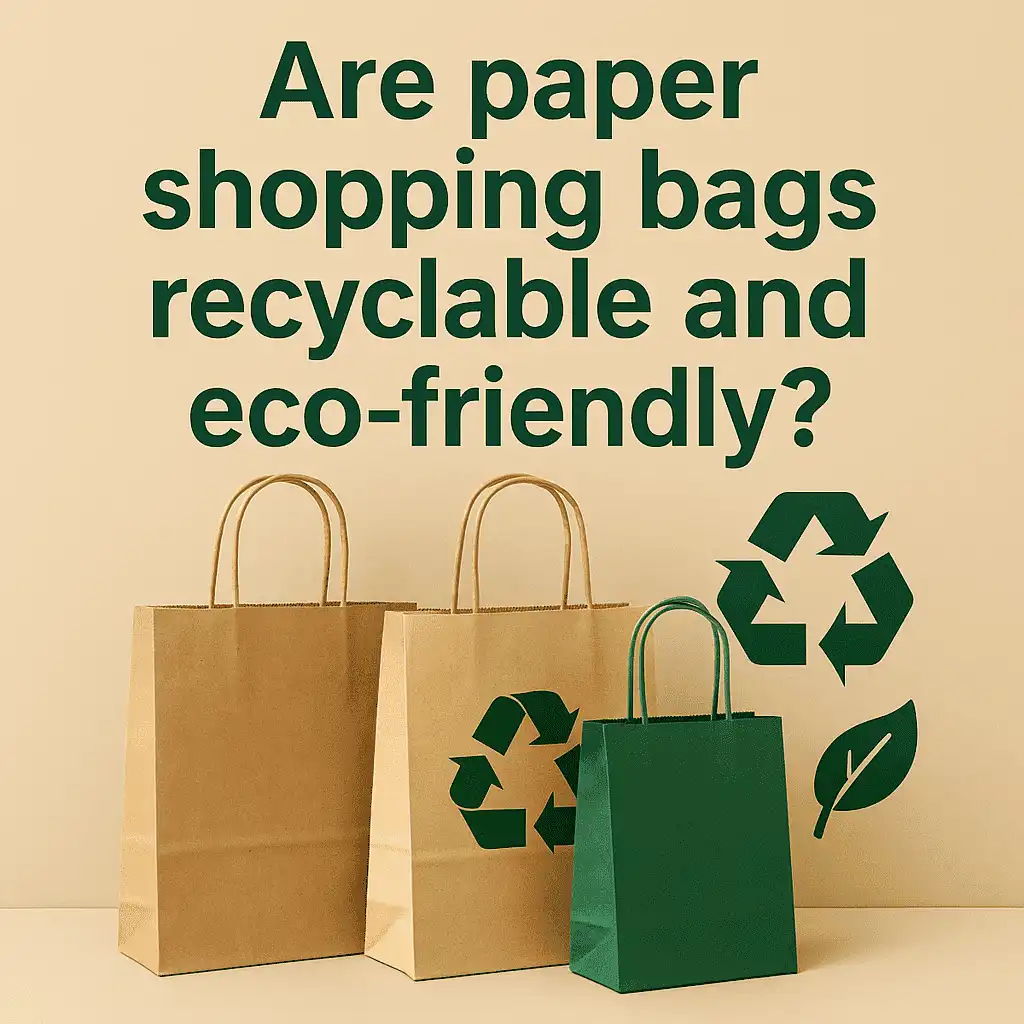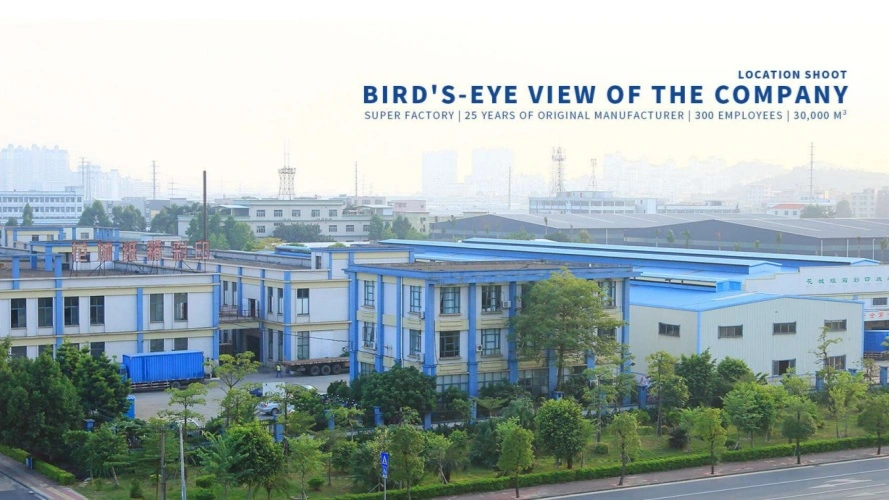Paper shopping bags are generally recyclable and eco-friendly when sourced from responsible manufacturers and disposed of properly. These sustainable packaging solutions break down naturally in composting environments and can be processed through standard recycling systems, making them an excellent alternative to plastic bags for environmentally conscious businesses. Paper shopping bags have become increasingly popular in retail and B2B sectors as businesses seek sustainable alternatives to plastic packaging. This comprehensive guide explores the recyclability and eco-friendliness of these bags, focusing on key insights relevant to purchasing managers, distributors, and OEMs in Europe and the USA. Understanding these factors proves crucial for making informed procurement decisions that align with environmental goals and regulatory requirements. We will address material composition, environmental impact, recycling practices, and sourcing strategies, offering a comprehensive guide tailored to B2B stakeholders aiming to enhance their sustainability profile while optimizing cost and supply chain efficiency. The packaging industry continues evolving toward greener solutions, making it essential for businesses to understand the full lifecycle impact of their choices.

Understanding Paper Shopping Bags: Composition and Environmental Impact
Paper bags vary primarily in the types of materials used, which directly affect their strength, durability, and biodegradability. Understanding these material differences helps procurement managers make informed decisions about which options best suit their specific requirements. Kraft paper stands out for its exceptional robustness and natural brown appearance, created from unbleached wood pulp. This material offers high tensile strength and tear resistance while maintaining recyclability. Recycled paper options emphasize sustainability credentials by utilizing post-consumer waste, though they may sacrifice some strength compared to virgin materials. Food-grade papers receive special treatments to ensure safety for direct food contact while maintaining environmental benefits. Biodegradability and compostability depend significantly on material composition and processing methods. Pure paper bags decompose within 2-6 months in industrial composting facilities, while home composting may take longer depending on conditions. The addition of coatings, laminations, or plastic elements can significantly extend decomposition times and complicate recycling processes. When compared to plastic bags, paper alternatives generally offer a lower carbon footprint and superior end-of-life options. Lifecycle analyses reveal important trade-offs businesses must consider, including higher water and energy consumption during production but dramatically better environmental outcomes after disposal. Paper production requires approximately 70% more energy than plastic bag manufacturing, yet the biodegradable nature and renewable source materials offset this initial investment through reduced long-term environmental impact.
Recyclability of Paper Shopping Bags: How and Why It Matters
While paper bags are largely recyclable, their actual recyclability depends on several critical factors that procurement managers must understand when selecting suppliers and specifications. Ink types, coatings, and handle materials significantly influence recycling success rates. Water-based inks pose minimal recycling challenges, while heavy metallic inks or plastic-based coatings can contaminate recycling streams. Paper handles maintain recyclability, whereas plastic or rope handles require removal before processing. European and American recycling infrastructures differ substantially, affecting the ease and efficiency of processing these materials. Proper recycling practices remain critical for maximizing recyclability rates. Separation of mixed materials, avoiding contamination from food residues, and removing non-paper components ensure optimal processing outcomes. Many recycling facilities can handle small amounts of adhesive and standard printing inks without issue, making most retail bags suitable for standard recycling streams. Common challenges include lamination layers, plastic windows for product visibility, and reinforced handles that reduce recycling rates. However, innovations in eco-friendly adhesives and detachable handle designs continue improving outcomes. Water-based laminations and biodegradable reinforcements offer solutions that maintain functionality while preserving recyclability.
Comparing Paper Shopping Bags with Alternative Packaging Options
Evaluating paper bags against plastic and reusable alternatives requires examining both environmental and economic factors that impact procurement decisions. Paper bags excel in biodegradability and positive consumer perception, though they typically involve higher upfront costs than plastic options. The limited reuse potential means customers generally use them once before disposal, unlike durable reusable bags. However, paper bags offer excellent branding opportunities through custom printing and finishing options that enhance customer experience. Reusable bags provide durability and repeated brand visibility suited for specific retail models, though they involve different logistical challenges including higher initial costs and customer adoption requirements. The break-even point for environmental benefits typically occurs after 4-10 uses, depending on material composition and manufacturing processes. Custom printing capabilities, handle designs, and ink selections significantly influence both sustainability impacts and customer experience. UV coatings, embossing, and specialty finishes can enhance visual appeal while maintaining recyclability when properly specified. These customization options allow brands to create memorable unboxing experiences while supporting environmental commitments.
Procurement Insights: Sourcing Eco-Friendly and Recyclable Paper Shopping Bags
Selecting appropriate suppliers proves paramount for ensuring consistent quality and sustainability assurance throughout your supply chain operations. Key certification criteria include FSC (Forest Stewardship Council) certification, recycled content verification, and food-grade standards that signal compliance with environmental and safety regulations. These certifications provide third-party validation of sustainability claims and help procurement teams verify supplier commitments to responsible practices. Supplier reliability regarding lead times and customization capabilities supports tailored procurement strategies. Manufacturers offering flexible minimum order quantities, rapid prototyping services, and consistent quality control systems prove most valuable for B2B partnerships. Popular models like kraft and recycled bags dominate wholesale purchases due to their cost-effectiveness and established eco-credentials. Embedding sustainability into procurement decisions enables companies to communicate CSR commitments clearly to clients and partners. This approach reinforces brand value while meeting increasing regulatory and consumer expectations across multiple markets. Documentation of environmental benefits and supplier certifications supports marketing efforts and regulatory compliance reporting.
Company Introduction & Our Eco-Friendly Paper Shopping Bag Solutions
FetchingPrinting specializes in providing wholesale packaging solutions designed to meet European and American B2B sustainability and quality standards. With over 20 years of experience serving 1,000+ loyal customers, our 35,000 m² facility houses 300+ employees operating industry-leading machinery including KBA106-(9+1) UV printing machines and Heidelberg XL162-6L printing systems. Our comprehensive material options support diverse sustainability requirements and performance specifications. We offer premium SBS C1S and C2S paperboards featuring bright white surfaces ideal for high-end retail applications. CCNB provides cost-effective solutions with recycled content, while brown kraft delivers authentic, natural appeal perfect for organic and artisanal brands. These materials support various finishing techniques including UV coating, hot foil stamping, embossing, and custom die-cutting. Beyond traditional shopping bags, we manufacture collapsible rigid boxes in three proprietary sizes protected by patents. Our Large size accommodates products 100-150mm tall, Medium fits 50-100mm heights, and Tiny handles 20-50mm products. These innovative designs save over 60% in shipping and storage costs compared to traditional rigid boxes while maintaining premium presentation quality. Our streamlined ordering process includes demand consultation, solution design, professional implementation with samples, and successful order placement. This systematic approach ensures every project meets exact specifications while maintaining our commitment to environmental responsibility through ISO14001-2015 Environmental Management System certification.
Frequently Asked Questions
Q1: Can all paper shopping bags be recycled?
A: Not all paper bags are recyclable. Bags with plastic lamination, metallic foils, or non-paper handles may not be accepted by standard recycling facilities. Pure paper bags with water-based inks typically recycle successfully, while heavily coated or wax-treated bags require special processing.
Q2: How do inks and coatings affect recycling?
A: Water-based and soy-based inks generally don't interfere with recycling processes. However, heavy metallic inks, plastic-based coatings, and certain laminations can contaminate recycling streams. UV coatings and standard print finishes typically pose minimal issues when properly formulated.
Q3: What certifications should I look for when sourcing sustainable bags?
A: Key certifications include FSC (Forest Stewardship Council) for responsible forestry, recycled content verification labels, and ISO environmental management standards. Food-grade certifications ensure safety for food contact applications, while G7 color management guarantees consistent print quality.
Partner with FetchingPrinting for Sustainable Paper Shopping Bag Solutions
Transform your packaging strategy with FetchingPrinting's comprehensive paper shopping bag manufacturer services. Our extensive experience serving diverse industries from food to electronics ensures we understand your unique sustainability challenges and branding requirements.
We offer complete customization capabilities including multiple material options, advanced printing technologies, and eco-friendly finishing techniques. Our R&D team of over ten packaging engineers provides expertise in new material applications, structural development, and process optimization. Whether you need kraft paper bags for organic products or premium coated options for luxury retail, we deliver solutions that balance environmental responsibility with exceptional performance.
Our ISO14001-2015 Environmental Management System certification and FSC compliance demonstrate our commitment to sustainable practices throughout our operations. Contact us at public@fetchingprinting.com to discuss your paper shopping bag supplier requirements and receive customized samples that showcase our quality and environmental benefits.
Conclusion
Paper shopping bags represent a genuinely recyclable and eco-friendly packaging solution when properly sourced and specified. Their biodegradability, renewable material base, and compatibility with existing recycling infrastructure make them superior environmental choices compared to plastic alternatives. Success requires careful attention to material selection, supplier certifications, and end-of-life considerations.
Procurement managers benefit from partnering with experienced manufacturers who understand both sustainability requirements and performance demands. FetchingPrinting's comprehensive capabilities, environmental certifications, and proven track record supporting 1,000+ customers provide the expertise needed for successful sustainable packaging transitions. The investment in eco-friendly packaging solutions delivers measurable benefits through enhanced brand reputation, regulatory compliance, and customer satisfaction while supporting global environmental goals.
References
1. Environmental Protection Agency. "Advancing Sustainable Materials Management: Paper and Paperboard Recycling Facts and Figures." Office of Resource Conservation and Recovery, 2021.
2. Forest Stewardship Council International. "FSC Certification Standards for Responsible Forest Management and Paper Products." FSC Global Guidelines, 2020.
3. International Organization for Standardization. "ISO 14001:2015 Environmental Management Systems - Requirements with Guidance for Use." ISO Environmental Standards, 2015.
4. American Forest & Paper Association. "Paper Manufacturing and Recycling: Environmental Impact Assessment and Lifecycle Analysis." AF&PA Research Division, 2022.
5. European Commission Directorate-General for Environment. "Packaging and Packaging Waste Directive: Implementation Guidelines for Recyclable Materials." EU Environmental Policy, 2021.
6. Sustainable Packaging Coalition. "Design Guidelines for Recyclable Paper-Based Packaging: Best Practices for B2B Procurement." SPC Industry Standards, 2023.


